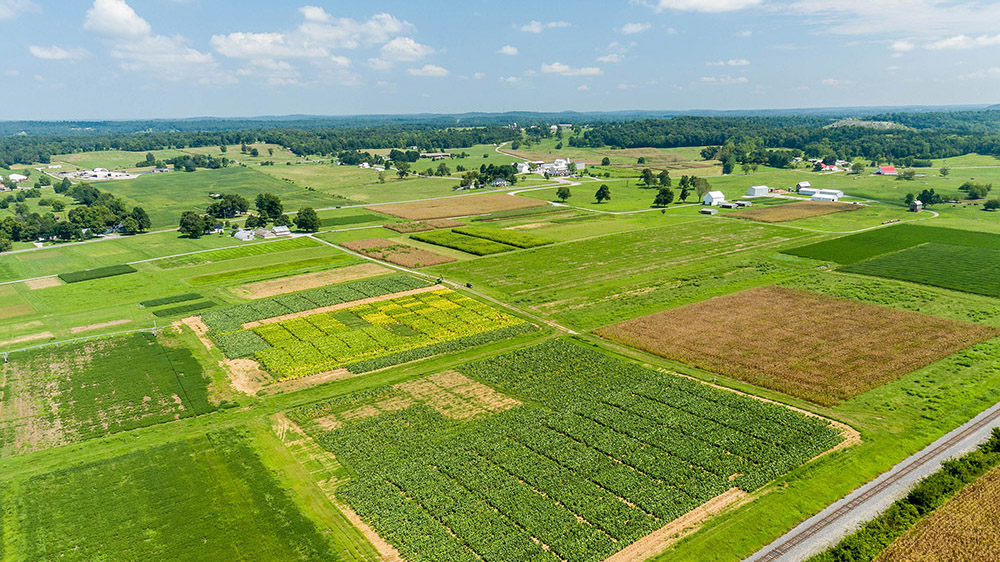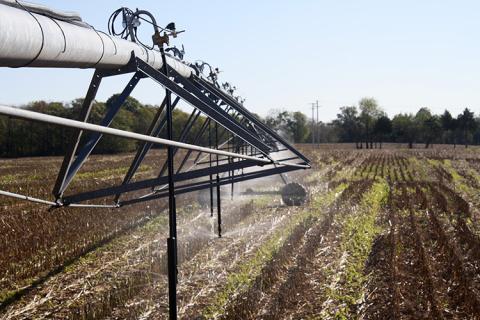UK Research and Education Center celebrates 100 years of environmental innovation
UK Research and Education Center celebrates 100 years of environmental innovation


The University of Kentucky Research and Education Center (UKREC) has been a champion of farm ecosystem improvement since its founding in 1925, a time when horses and mules were more common than tractors and the first Earth Day was decades away. For nearly a century, UKREC’s dedicated staff have pioneered sustainability research, addressing Kentucky farmers’ aspirations to protect our natural resources and celebrate Earth Day’s principles every day.
According to reports from Samuel Lowry, the Princeton station's first superintendent, work focused on land reclamation and soil fertility enhancements as soon as the land was purchased from area farmers. The earliest projects of the 1920s and 30s established the benefits of soil amendments and long-term crop rotation for grain crops planted after grasses and legumes.
In a 1955 summary of the station’s first 30 years of management and research, Lowry stated that “The soil at the Substation’s sandstone land was very unproductive when experimentation started. However, it has responded remarkably well to liming, fertilization, and good soil management.”
During the time of the report, post-World War II agricultural research in American had shifted its focus to effectively use previously unavailable machinery and chemical technologies. This need was driven by a surge in global food demand, labor shortages and government incentives to specialize.
While UKREC research continued to assist farmers in adopting the tools of the mid-20th century, Princeton also continued to be a leader in environmental sustainability due to the expertise and forethought of its staff.
Saving and Improving Soils
Since the 1960s, UKREC has fostered the no-till and minimum-till production systems that are now used worldwide and on at least half of domestic cropland, according to the U.S. Department of Agriculture’s 2022 Census of Agriculture.
No-till farming, which leaves the soil undisturbed during planting, was first attempted in Kentucky by the late Christian County farmer Harry Young. Like-minded area farmers followed suit, but adopting a new technique was not without its challenges. Many UKREC and Lexington-based experts worked in concert with early adopters to address their issues.
Although the goal of no-till was to reduce soil erosion, UKREC research found that over time, it also reduced soil compaction while increasing moisture and organic matter. Long-term studies have also shown that no-till systems could achieve similar or greater yields on corn, soybeans and wheat than tilled systems with proper management adjustments.
Due to decades of farmer collaboration and research – including variety trials, cover crops, integrated pest management and the development of a corn-wheat-soybean rotation – UK Department of Plant and Soil Sciences extension professor and Grain and Forage Center of Excellence director Chad Lee says Kentucky farmers are ahead of their time.
“Kentucky farmers in the 1960s were adopting revolutionary concepts to keep soil in its place,” Lee said. “Those farmers, alongside our university, instituted practices and systems that were not only better for soils, but for the environment and anything downstream.”
Saving and Improving Water
“The greatest environmental risk for Kentucky agriculture is a drought in mid-summer, when water and nutrient uptake are critical for crops,” Lee said, “though that is tough to think about after the rains we’ve had recently.”
He went on to say that water quantity and quality concerns led to irrigation studies at UKREC following the drought of 2012. Some of these studies were part of the Grain and Forage Center of Excellence, an initiative headquartered at UKREC and created to address the need for increased agricultural production with fewer resources and reduced, or improved, environmental impact.

One such study was conducted by UK professor and soil physicist Ole Wendroth in cooperation with Western Kentucky farmer Trevor Gilkey. Following years of research testing precision agriculture tools to reduce nutrient applications, Wendroth and Gilkey looked at variable-rate irrigation to conserve water and prevent runoff, which can carry soil and nutrients to waterways.
While very few crop acres are irrigated in Kentucky, Lee said rainfall may not occur at critical growing periods. According to Wendroth, irrigation is actually a way to practice environmental stewardship.
“Irrigation keeps the soil wet, which means plant roots better penetrate the soil and take up nutrients," Wendroth said. “This lowers the amount of nitrogen in the soil and reduces our risk of nitrate leaching during the winter, when we tend to have a lot of rainfall.”
Kentucky farmers are environmental innovators
Lee said UKREC's projects have served as the fundamental practices for sustainable and regenerative agriculture movements.
“When the term ‘regenerative agriculture’ came about, many Kentucky farmers were already on their second or third generation implementing those practices.”
One hundred years after the first research to improve soil fertility, Carrie Knott, UKREC’s current director and extension grains specialist, said the UKREC researchers are honored to work with innovative farmers to identify problems and create solutions that prioritize environmental sustainability.
“Farmers are the ultimate conservationists,” Knott said. “They see day to day, year to year, and in many cases decade to decade, how management practices impact the land. Their intimate knowledge of the land along with their reliance upon it, drive farmers to be fiercely protective of this precious resource.”
No-till farming and precision agriculture are a sample of the innovative, environmentally-conscious projects conducted at UKREC. Many others – such as on-farm energy efficiencies, utilizing agricultural byproducts, and improving crop varieties for Kentucky climate conditions – are detailed in UKREC’s 100-year history at https://ukrec.ca.uky.edu.
###
Writer: Jennifer Elwell, jennifer.elwell@uky.edu
 The University of Kentucky Research and Education Center (UKREC) at Princeton is proudly celebrating 100 years of advancing agricultural extension, research, education, leadership and service to the Commonwealth. Founded in 1925, UKREC is part of the Martin-Gatton College of Agriculture, Food and Environment, as well as the Kentucky Agricultural Experiment Station and the Kentucky Cooperative Extension Service. A vital part of the Princeton community, UKREC’s impact extends across Kentucky and beyond. To mark this milestone, Martin-Gatton CAFE will host a variety of events and training sessions throughout the year, showcasing UKREC’s legacy of excellence and ongoing commitment to UK’s mission of improving lives through teaching, research and extension.
The University of Kentucky Research and Education Center (UKREC) at Princeton is proudly celebrating 100 years of advancing agricultural extension, research, education, leadership and service to the Commonwealth. Founded in 1925, UKREC is part of the Martin-Gatton College of Agriculture, Food and Environment, as well as the Kentucky Agricultural Experiment Station and the Kentucky Cooperative Extension Service. A vital part of the Princeton community, UKREC’s impact extends across Kentucky and beyond. To mark this milestone, Martin-Gatton CAFE will host a variety of events and training sessions throughout the year, showcasing UKREC’s legacy of excellence and ongoing commitment to UK’s mission of improving lives through teaching, research and extension.
The Martin-Gatton College of Agriculture, Food and Environment is an Equal Opportunity Organization with respect to education and employment and authorization to provide research, education information and other services only to individuals and institutions that function without regard to economic or social status and will not discriminate on the basis of race, color, ethnic origin, national origin, creed, religion, political belief, sex, sexual orientation, gender identity, gender expression, pregnancy, marital status, genetic information, age, veteran status, physical or mental disability or reprisal or retaliation for prior civil rights activity.
Extension Plant & Soil Sciences Research UKREC

